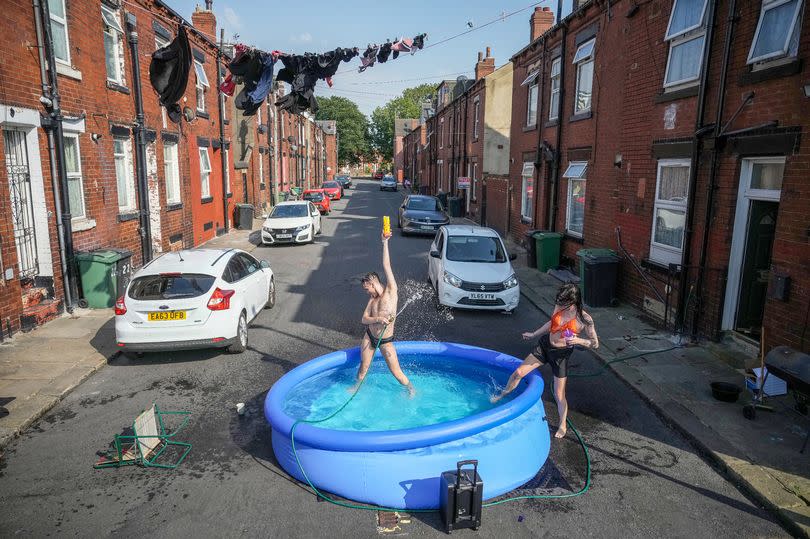The deadly disease that can hide in paddling pools - how to avoid it and symptoms to look for as heat rises

This week looks set to turn sunny after several weeks of rain, prompting everyone to make the most of the fine weather. But water experts have issued a warning about a disease that can lurk in hot tubs and paddling pools.
Plumbing experts have shared the risks of Legionnaires' disease, which can develop in stagnant water. The Chartered Institute of Plumbing and Heating Engineering (CIPHE) has provided crucial advice on how to stay safe as families enjoy their final weeks out of school.
While the risks posed by legionella, the bacteria that causes Legionnaires' disease, are relatively minor for healthy adults, they can be more severe for children or anyone with a weakened immune system. Symptoms include headaches, muscle pains, coughing and fever after inhaling the bacteria. In extreme cases, the disease can be fatal, warns the institute.
READ MORE: Greater Manchester weather: Temperatures to soar to 26C today as heat health alert kicks in
What is legionella and where can it hide?
The bacteria thrives in stagnant water between 20-45C, so it's essential to drain any water that's been sitting in a warm environment for a while. This includes garages, greenhouses, water butts, or outdoor storage boxes exposed to direct sunlight, advises the CIPHE.
Kevin Wellman, CEO of the CIPHE, has emphasised the importance of draining your garden hose after each use to prevent the growth of legionella bacteria. He explained that the water left in the hosepipe can become a breeding ground for the bacteria when exposed to warm sunshine - so make sure to empty your hose after each use to avoid legionella.
He warned: "Subsequent use of the hose can then mean the bacteria travels via tiny water droplets where it can then be inhaled by anyone nearby. The risks are particularly high for those with compromised immunity even when the hose is used regularly to fill paddling pools, clean bicycles or water plants in the evening, it should be drained after every use."
The plumbing experts also advised people to ensure their hot tubs aren't harbouring legionella. Kevin said: "These have grown in popularity over recent years, so it's vital that homeowners understand how to run them safely, especially because they can be ideal incubators for legionella."
He added: "When left for any length of time, the risk of legionella infection increases significantly. But fortunately, there is a relatively simple way to stop this from happening.
"If you own a hot tub, always make sure it's been dosed with the right chemicals at the correct levels before switching it on. Chlorine and bromine are the most common - this will keep the risk to a minimum.
"And if you're visiting somewhere with a hot tub, it's always best to check with the owner when it was last treated so you can be sure that water-borne illnesses won't get in the way of your relaxation."
The NHS has stated: "You can get Legionnaires' disease if you breathe in tiny droplets of water containing bacteria that cause the infection.
"It's usually caught in places like hotels, hospitals or offices where the bacteria have got into the water supply. It's less common to catch it at home.
"You can get Legionnaires' disease from things like:.
air conditioning systems
humidifiers
spa pools and hot tubs
taps and showers that are not used often
"You cannot usually get it from:
drinking water that contains the bacteria
other people with the infection
places like ponds, lakes and rivers"
What are the symptoms of Legionnaires' disease?
According to the NHS, symptoms of Legionnaires' disease include:
a cough
shortness of breath
chest pain or discomfort, particularly when breathing or coughing
a high temperature
flu-like symptoms
Ask for an urgent GP appointment or get help from NHS 111 if you have symptoms of Legionnaires' disease such as:
a cough that's lasted 3 weeks or more
coughing up blood
chest pain that comes and goes, or happens when breathing or coughing
feeling short of breath
Tell them where you've been in the last 10 days, such as if you stayed in a hotel, spa or hospital.
You can call 111 or get help from 111 online.

 Yahoo News
Yahoo News 
